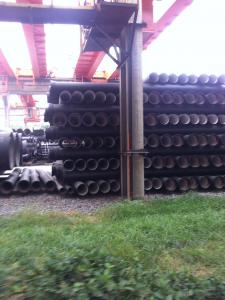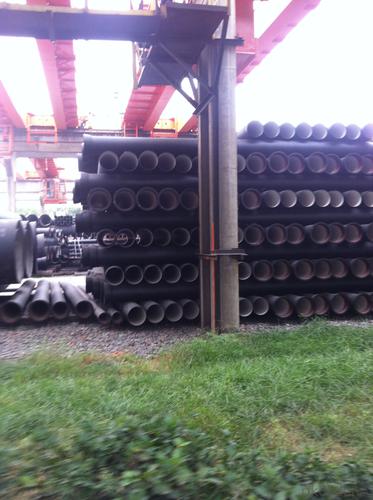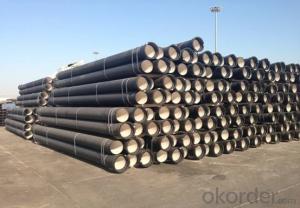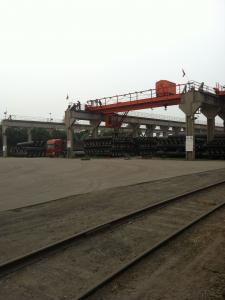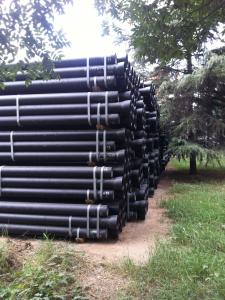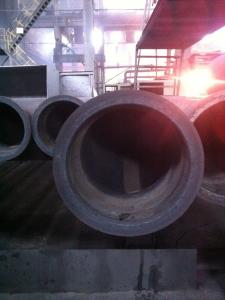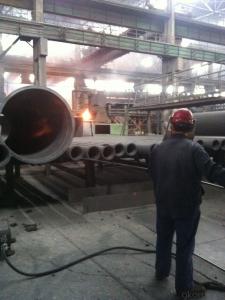DUCTILE IRON PIPES AND PIPE FITTINGS K9 CLASS DN1300
- Loading Port:
- Tianjin
- Payment Terms:
- TT OR LC
- Min Order Qty:
- 22 pc
- Supply Capability:
- 3000 pc/month
OKorder Service Pledge
OKorder Financial Service
You Might Also Like
Material : Ductile Cast Iron
Size Range : DN 80mm to DN 2000mm
Unit Effective Length : 6m or 5.7m
Manufacture Standard: ISO 2531:1998/ EN 545:2006/EN 598:2007
Annual capacity : 200,000 tons
Coating Exterior: Zinc 130g/m2 according to ISO 8179-1 and bitumen coating 70 microns.
Cement Interior: Portland Cement/ High Alumina Cement/ Sulphate Resisting Cement Lining according to ISO 4179
Special requirements on external coating and internal lining can be applied
We also provide accessories such as SBR/EPDM rubber gaskets, lubricant paste, pipe caps, PE sleeves, etc.
Additional Parts:
Each pipe is strictly inspected according to related standard to ensure permanently high performance.
Easy Installation at site and service free for life
Long Service Lifespan
Quotation will arrive you within 24hours once we get your inquiry.
We guarantee offering you a competitive price.
A copy of original inspection reports of pipes will be offered after shipment.
Photos of loading process will be sent to the customer after shipment effect.
We will follow-up the delivery progress after shipment effect and update to the customer on weekly basis.
- Q: Are ductile iron pipes suitable for use in cold climates?
- Yes, ductile iron pipes are suitable for use in cold climates. Ductile iron possesses excellent resistance to low temperatures, making it highly suitable for use in freezing conditions. Its high durability and strength enable it to withstand extreme temperatures and harsh weather conditions commonly found in cold climates.
- Q: Can ductile iron pipe be used for bridge crossings?
- Ductile iron pipe is suitable for bridge crossings due to its strength, durability, and flexibility. Its high tensile strength enables it to bear heavy loads and vibrations, making it ideal for supporting bridges and withstanding traffic weight. Moreover, the pipe's flexibility allows it to absorb movements and deformations caused by temperature changes, settling, and other factors, minimizing the risk of structural damage and ensuring the bridge crossing's longevity. Additionally, the pipe's resistance to corrosion makes it a dependable choice for bridge crossings exposed to moisture, chemicals, and other corrosive elements. Overall, ductile iron pipe possesses properties that make it a reliable and appropriate material for bridge crossings.
- Q: How are ductile iron pipes protected against internal scaling or buildup?
- Various methods are utilized to protect ductile iron pipes against internal scaling or buildup. One widely employed technique involves applying a cement mortar lining to the inner surface of the pipes. This lining serves as a protective barrier, preventing the formation of scale or buildup and facilitating the smooth flow of water or other fluids. Moreover, an additional layer of polyethylene or other appropriate materials can be coated onto the pipes to provide an extra level of protection against scaling or buildup. This coating acts as a barrier between the water and the iron surface, thereby reducing the likelihood of corrosion or scale formation. Regular maintenance and cleaning play a crucial role in preventing internal scaling or buildup in ductile iron pipes. By flushing the pipes with high-pressure water or employing chemical treatments, any accumulated scale or debris can be effectively removed, ensuring the pipes remain clean and fully functional. Furthermore, proper water treatment is essential in minimizing the risk of scaling or buildup. By implementing suitable water treatment processes, such as pH adjustment or the use of corrosion inhibitors, the quality of the water can be maintained, preventing the formation of scale or buildup inside the pipes. In conclusion, various measures, including cement mortar lining, pipe coating, regular maintenance, cleaning, and proper water treatment, are employed to protect ductile iron pipes against internal scaling or buildup. These measures ensure the longevity and efficiency of the pipes, minimizing the chances of clogging or reduced flow capacity.
- Q: Are ductile iron pipes resistant to chemical attacks?
- Yes, ductile iron pipes are generally resistant to chemical attacks. They have a protective lining that prevents the corrosive effects of various chemicals, making them suitable for transporting a wide range of liquids including water, sewage, and industrial waste.
- Q: What is the purpose of ductile iron pipes?
- The purpose of ductile iron pipes is to provide a strong and durable infrastructure for transporting various fluids, including water, sewage, and industrial materials. Their high tensile strength and flexibility make them ideal for withstanding high-pressure conditions, resisting corrosion, and accommodating ground movements, ensuring efficient and reliable delivery of essential resources.
- Q: What is ductile iron pipe?
- Ductile iron pipe is a kind of cast iron pipe. In quality, the spheroidization of cast iron pipes is controlled to be 1-3 (spheroidization rate 80%), so the mechanical properties of the material have been better improved, with the nature of iron and the properties of steel. Ductile cast iron pipe after annealing, the microstructure is ferrite and pearlite, good mechanical properties, excellent corrosion resistance, good ductility, good sealing effect, simple installation, mainly for municipal, industrial and mining enterprises, water supply, gas, oil etc..
- Q: What is the expected sound attenuation of ductile iron pipes?
- Several factors can affect the expected sound attenuation of ductile iron pipes. Generally, these pipes have good sound attenuation properties due to their dense construction and thick walls. The density of the material helps absorb and dampen sound waves, reducing noise transmission. Additionally, the thickness of the pipe walls adds an extra barrier for sound to pass through, contributing to sound attenuation. However, it's important to consider other factors that can influence the specific sound attenuation of ductile iron pipes. These factors include pipe diameter, wall thickness, installation method, and the surrounding environment. For example, larger diameter pipes may have slightly lower sound attenuation compared to smaller diameter pipes due to their increased surface area. Additionally, variations in wall thickness can affect the sound insulation properties. During installation, the presence of joints or fittings in the pipeline can create points where sound can transmit, reducing sound attenuation. Therefore, it is recommended to use proper installation techniques that minimize the use of joints and fittings to enhance sound attenuation. The surrounding environment also plays a role in sound attenuation. For instance, if the pipes are buried in soil, the composition and density of the soil can affect sound transmission properties. Moreover, the presence of other structures or materials nearby may influence the overall sound attenuation performance. To determine the specific expected sound attenuation of ductile iron pipes for a particular application, it is advisable to consult manufacturer specifications or seek assistance from acoustic engineering professionals. They can consider all relevant factors and conduct specific tests or simulations to provide accurate predictions.
- Q: Are ductile iron pipes suitable for irrigation canal systems?
- Absolutely, irrigation canal systems can indeed benefit from the use of ductile iron pipes. These pipes have gained recognition for their exceptional robustness and durability, rendering them exceptionally well-suited for withstanding the immense pressure and load demands of irrigation canal systems. They exhibit remarkable resistance to external forces, such as heavy machinery, and can effortlessly endure the stresses caused by soil movement and settlement. Moreover, ductile iron pipes boast remarkable resistance to corrosion and feature a flawlessly smooth inner surface. This smoothness significantly reduces friction and ensures a highly efficient flow of water. This particular quality is of utmost importance in irrigation systems, as it enables the effective distribution of water to crops, thereby guaranteeing their optimal growth and yield. Furthermore, ductile iron pipes boast an impressively long lifespan, often exceeding a century. This longevity makes them a truly cost-effective option for irrigation canal systems. Additionally, their minimal maintenance requirements further enhance their suitability for this particular application. Ultimately, ductile iron pipes possess all the essential characteristics necessary for irrigation canal systems, including strength, durability, corrosion resistance, and efficiency. As such, they represent a highly fitting choice for the purpose at hand.
- Q: Can ductile iron pipes be repaired if damaged?
- If there is any damage to ductile iron pipes, they can indeed be repaired. The process of repairing them involves several steps. Firstly, it is necessary to identify and isolate the damaged section of the pipe. Once this has been accomplished, the damaged portion of the pipe is typically cut out and removed. Subsequently, a new section of pipe is inserted and connected to the existing pipeline using appropriate methods such as welding or mechanical jointing. The repaired section is then tested to guarantee its integrity and functionality. It is important to note that the repair process may vary depending on the extent and nature of the damage. Therefore, it is always advisable to seek advice from professionals who specialize in ductile iron pipe repairs to ensure a proper and effective restoration is achieved.
- Q: How many casting methods are there in ductile iron casting? A 60*6 discus can not have sand holes. Its surface is smooth. What process can be used to make it?
- The metal mould is ok! The surface quality of the casting is better than that of the sand mold. But later heat treatment is needed.
Send your message to us
DUCTILE IRON PIPES AND PIPE FITTINGS K9 CLASS DN1300
- Loading Port:
- Tianjin
- Payment Terms:
- TT OR LC
- Min Order Qty:
- 22 pc
- Supply Capability:
- 3000 pc/month
OKorder Service Pledge
OKorder Financial Service
Similar products
Hot products
Hot Searches
Related keywords
